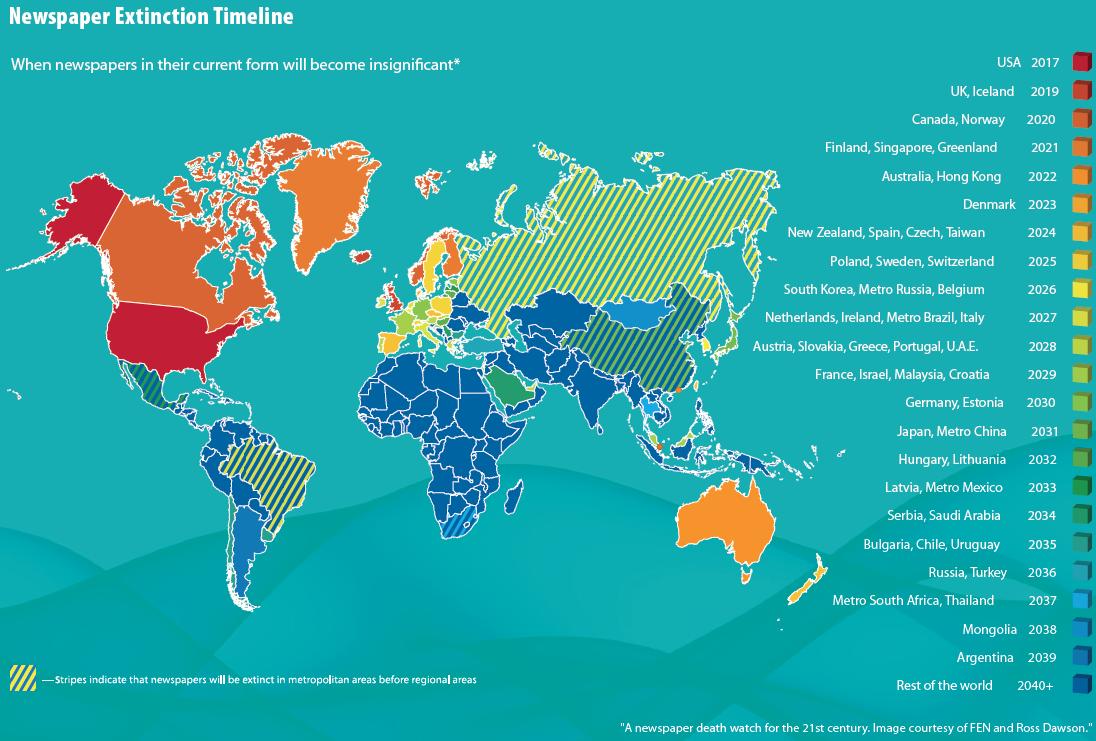|

On Ross Dawson's map of the world, North America is a mess of hot red and burnt orange. Across the Atlantic, Africa is drenched in deep blue, while green and sapphire stripes cover China's mainland. The colors have a purpose. Dawson, a futurist, is using this hot-cold spectrum to chart the end of printed news.
Dawson's "Newspaper Extinction Timeline" map first created waves last year with its assertion that by 2017, American newspapers as we know them today will be obsolete. The rise of digital technology is relegating print editions to the dustbin faster than they can be, well, printed. No more fingers smudged with ink, no more wrestling with unwieldy pages too large to turn.
Africa, by contrast, may be reaping profits from printed newspapers well into the 2040s. (Hence its blue shading on the map – no state of emergency is being declared for the continent unlike its neighbor to the west.) And Chinese newspapers have at least a few more decades of prominence; the stripes indicate they will die out in metropolises like Beijing and Shanghai first before losing ground in smaller cities and rural areas.
While the Internet and its attendant devices – desktop computers, laptops, tablets – are being blamed for the fall of Western paper empires, little has been said about the Web's impact in Africa. Personal computers are few on the continent. In a 2008 list drawn up by the International Telecommunications Union, Mauritius and Namibia were the only African nations found among the world's top 48 countries ranked according to computer ownership. But this data obscures a different trend, one that could upend Dawson's optimistic forecast for print media in Africa: the rise of the mobile phone.
That's a smart phone you've got there
Where PCs lag, mobile phones have surged ahead. Outfitted with 3G technology and wired for the Internet, they outstrip computers at a ratio of 16 to 1 in Africa, according to a 2011 report published by MobileMonday. Also known as MoMo, the networking organization for mobile industry professionals has chapters worldwide – from Algiers and Beijing, to Kampala, Lagos and Shanghai.
This reality has had a profound impact on the continent's technology communities. By 2015, Sub-Saharan Africa will have more people equipped with mobile access than household electricity, and so, increasingly, software developers are choosing to build applications ("apps") for phones instead of computers. Institutions dedicated solely to mobile app development, like m:Lab in Nairobi, Kenya, are being launched.
Jon Gosier heads a company called Appfrica Labs based out of Kampala, Uganda. He believes that media operations should keep a trained eye on the sea of apps sweeping the continent. "If you're a print media house [in Africa] looking at where things are going, you have to think of ways to be ahead of the curve," he says. "Otherwise you're going to end up being irrelevant like a lot of media houses in the West did."
Since 2008 and 2009, many American newspapers have shelved their print editions, and magazine weeklies have cut down on page numbers in an attempt to combat advertising losses. Circulation, on the whole, is down. It's a picture far different than in Africa, where print journalism still has "a strong social element," according to Erik Hersman, one of m:Lab's founders.
"It's still one of the regions of world where print journalism is still making a lot of money," says the Kenyan technologist. "But the question is, is it just lagging other regions around the world? I think it's just lagging. We're going to see ordinary people wanting to get more of that information via their phone instead of buying a newspaper."
|